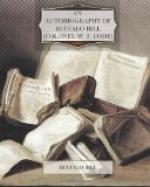Mr. Majors agreed that I could do this, and consented to employ me. I was to receive a man’s wages, forty dollars a month and food, and the wages were to be paid to my mother while I was gone. With forty dollars a month she would be able to support her daughters and my baby brother in comfort. Before I was allowed to go to work Uncle Aleck handed me the oath which every one of his employees must sign. I did my best to live up to its provisions, but I am afraid that the profanity clause at least was occasionally violated by some of the bull-whackers. Here is the oath:
“We, the undersigned wagon-masters, assistants, teamsters and all other employees of the firm of Russell, Majors & Waddell, do hereby sign that we will not swear, drink whisky, play cards or be cruel to dumb beasts in any way, shape or form.
his
(Signed) “William Frederick X
Cody.”
mark
I signed it with my mark, for I could not write then. After administering this ironclad oath Mr. Majors gave each man a Testament.
My first job was that of accompanying a herd of cattle destined for beef for the troops that had gone on ahead. Bill McCarthy, boss of the outfit, was a typical Westerner, rough but courageous, and with plenty of experience on the frontier.
We progressed peacefully enough till we made Plum Creek, thirty-six miles west of Fort Kearney, on the South Platte. The trip had been full of excitement for me. The camp life was rough, the bacon often rusty and the flour moldy, but the hard work gave us big appetites. Plainsmen learn not to be particular.
I remember that on some of our trips we obtained such “luxuries” as dried apples and beans as part of our supplies. We could only have these once every two or three days, and their presence in the mess was always a glad occasion.
We were nooning at Plum Creek, the cattle spread out over the prairie to graze in charge of two herders. Suddenly there was a sharp Bang! Bang! Bang! and a thunder of hoofs.
“Indians! They’ve shot the herders and stampeded the cattle!” cried McCarthy. “Get under the banks of the river, boys—use ’em for a breastwork!”
We obeyed orders quickly. The Platte, a wide, shallow, muddy stream, flows under banks which vary from five to thirty feet in height. Behind them we were in much the position of European soldiers in a trench. We had our guns, and if the Indians showed over the bank could have made it hot for them.
McCarthy told us to keep together and to make our way down the river to Fort Kearney, the nearest refuge. It was a long and wearying journey, but our lives depended on keeping along the river bed. Often we would have to wade the stream which, while knee-deep to the men, was well-nigh waist-deep to me. Gradually I fell behind, and when night came I was dragging one weary step after another—dog-tired but still clinging to my old Mississippi Yaeger rifle, a short muzzle-loader which carried a ball and two buckshot.




